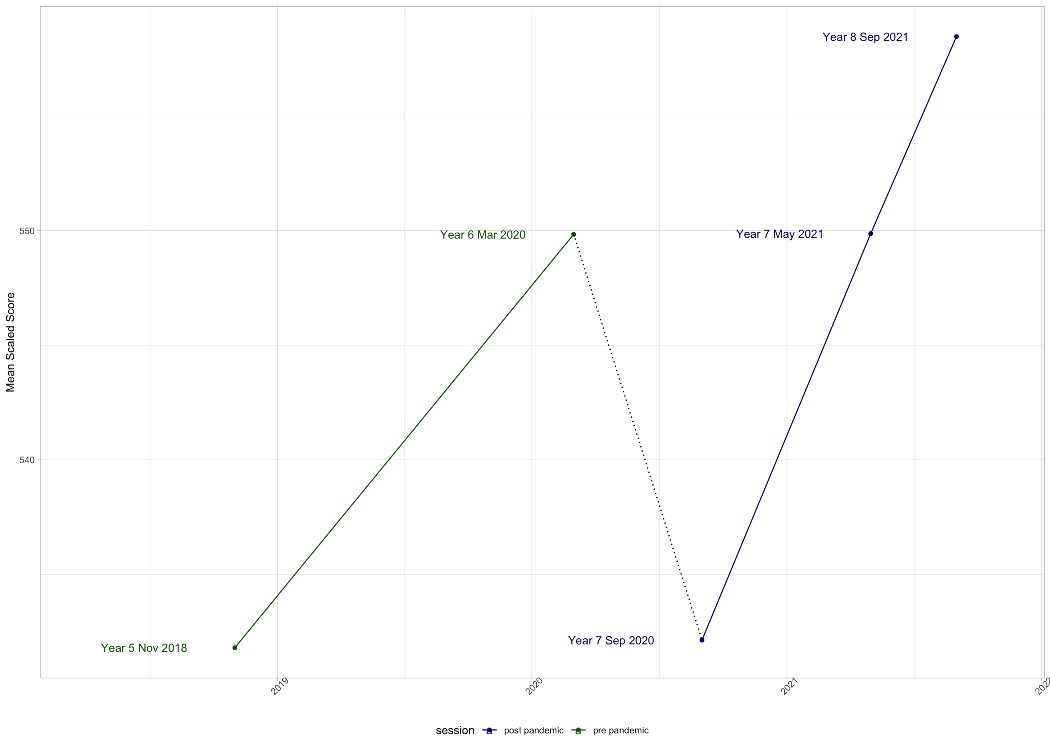Improvements in writing among a cohort of pupils badly affected by the Covid-19 pandemic show we may be better off talking about learning decay rather than learning loss, writes Daisy Christodoulou.
At No More Marking, we provide schools with online comparative judgement assessments of writing.
Comparative judgement is a different way of assessing writing. It relies on holistic teacher judgement rather than tick-box mark schemes, and it allows for reliable assessments of hundreds of thousands of pieces of writing.
These large-scale assessments offer some fascinating insights about pupil attainment before and after the impact of Covid-19.
The current year 8 cohort are a particularly interesting group to focus on, because their final year of primary was heavily disrupted, and they started secondary school in September 2020.
We’ve tracked the same cohort for four years
We’ve assessed about a quarter of a million pieces of writing from this cohort over the past four years.
Back in November 2018, when they were in year 5, they scored 532 on the universal writing scale we’ve built.
We assessed them again in March 2020, just a week or two before the first lockdown. This time, they scored 550. That type of improvement is what we’d normally expect at the end of primary.
And normally, we’d have expected the pupils to continue improving, and score about 557 in September of Year 7.
But reality was different from expectations: in our September year 7 assessment, the average score was just 532. That is, the year 7s were attaining the same level as in November of year 5. They were 22 months behind expectations!
Year 7 results attracted attention
This result understandably attracted a bit of attention at the time. It was a larger fall than was being seen in standardised assessments of maths and reading, which were reporting declines of just a few months.

We hypothesised at the time that writing may be more sensitive to instruction than maths and reading. Anecdotally, we also heard from lots of schools and teachers that it was harder to set work that involved writing during lockdown.
We also wondered about how permanent these losses were. Research on memory shows that relearning something you have forgotten is not as difficult as learning something for the first time.
Think of it this way: suppose you and a friend decide to learn French. You didn’t study French at school. Your friend did, and got a B in their GCSE, but it’s been ten years since and they’ve forgotten everything.
You both take a placement test which recommends that you both start on a beginners’ course. But as the course goes on, your friend moves ahead much faster than you. Their five years of school French hasn’t been totally forgotten. It was just very rusty.
In foreign language learning, these students are called ‘false beginners’. They genuinely don’t know much of the language at the start, but they are able to progress much faster than a true beginner.
That’s why we suggested that it might be better to talk about learning decay, not learning loss.
But pupils ‘hadn’t lost everything they’d learnt’
Our year 7s were scoring at the level of year 5s, true. But that didn’t mean they’d completely lost everything they’d learnt in the intervening two years, or that it would take two years just to make up those losses.
Since then, we have followed up with this cohort twice: once in May of year 7, and again in September of year 8. And they have indeed made back a lot of these losses.
They aren’t quite back to where we’d expect at the start of year 8, but they are not far off it, and their rate of progress suggests it won’t be long before they are completely back on track.
Of course, this is just one subject. Other subjects didn’t see such big falls and might not see such sharp rebounds. But it does offer reasons to be cheerful.
The pandemic has had a huge impact. But students are resilient, schools have got them learning again, and we may be better off talking about learning decay rather than learning loss.















Your thoughts